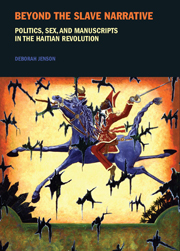Book contents
- Frontmatter
- Contents
- Acknowledgments
- Introduction: Race and Voice in the Archives: Mediated Testimony and Interracial Commerce in Saint-Domingue
- Part I Authorizing the Political Sphere
- 1 Toussaint Louverture, “Spin Doctor”? Launching the Haitian Revolution in the Media Sphere
- 2 Before Malcolm X, Dessalines: Postcoloniality in a Colonial World
- 3 Dessalines's America
- 4 Reading Between the Lines: Dessalines's Anticolonial Imperialism in Venezuela and Trinidad
- 5 Kidnapped Narratives: The Lost Heir of Henry Christophe and the Imagined Communities of the African Diaspora
- Part II Authorizing the Libertine Sphere
- Epilogue
- Index
3 - Dessalines's America
from Part I - Authorizing the Political Sphere
- Frontmatter
- Contents
- Acknowledgments
- Introduction: Race and Voice in the Archives: Mediated Testimony and Interracial Commerce in Saint-Domingue
- Part I Authorizing the Political Sphere
- 1 Toussaint Louverture, “Spin Doctor”? Launching the Haitian Revolution in the Media Sphere
- 2 Before Malcolm X, Dessalines: Postcoloniality in a Colonial World
- 3 Dessalines's America
- 4 Reading Between the Lines: Dessalines's Anticolonial Imperialism in Venezuela and Trinidad
- 5 Kidnapped Narratives: The Lost Heir of Henry Christophe and the Imagined Communities of the African Diaspora
- Part II Authorizing the Libertine Sphere
- Epilogue
- Index
Summary
The news of the entry into the colony of two blacks from Saint-Domingue bearing the proclamations of Dessalines turned out to be only an unfounded rumor. But the decree I had the honor of mentioning to you […] really was printed, in both French and English, in the newspapers of the United States.
Bertolio, May 3, 1804The Government of the Island of Hayti (St. Domingo) has directed the publication of the following arête in the papers of the United States.
Columbian Centinel (Massachusetts), May 5, 1804Declaring Independence
The moving public spectacle of the inauguration of the first black president of the United States in January of 2009 prompted many Haitians and friends of Haiti to think back to the ascension of the first black leader in a New World nation, Jean-Jacques Dessalines, in January of 1804. The coming to power of Dessalines coincided with the celebration of the new nation's independence through a formal declaration of independence. Thomas Jefferson described the U.S. Declaration of Independence as “an instrument pregnant with […] the fate of the world,” and it was in Haiti, as David Armitage has noted, that the declaration of independence as a genre began its trajectory from a single nation's document to a “global history” of “imitations and analogues.”
- Type
- Chapter
- Information
- Beyond the Slave NarrativePolitics, Sex, and Manuscripts in the Haitian Revolution, pp. 122 - 160Publisher: Liverpool University PressPrint publication year: 2011

